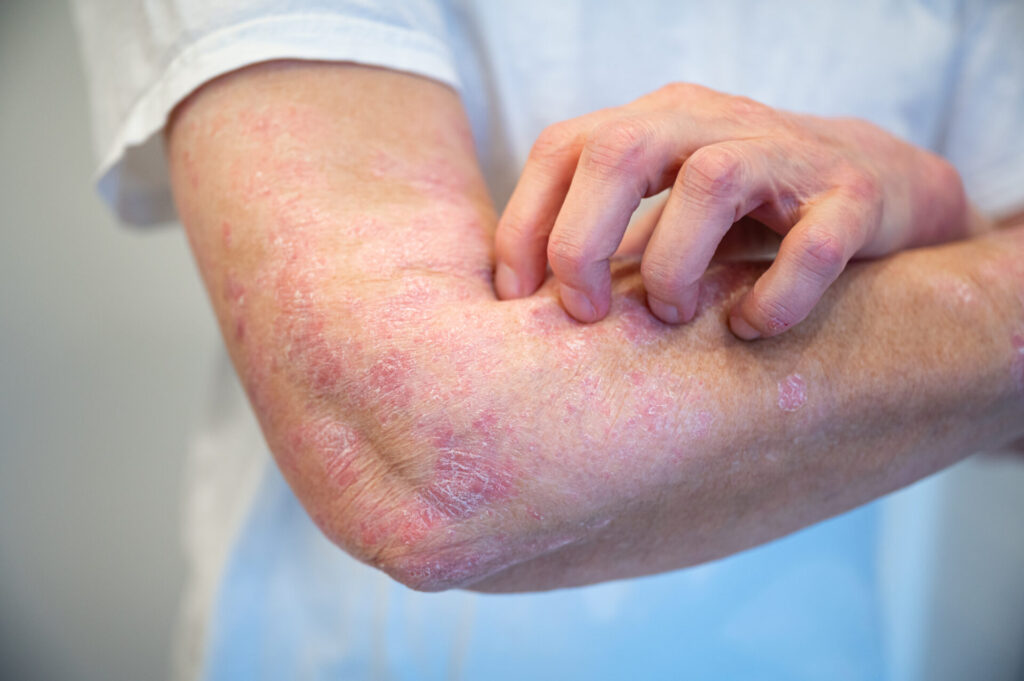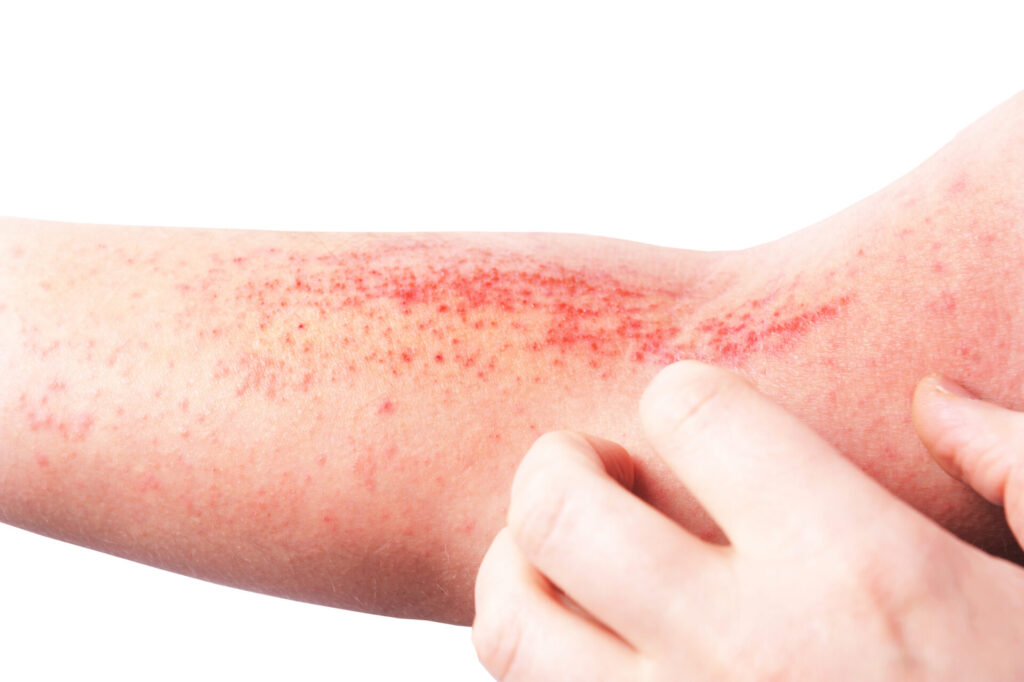If you develop a rash after exposure to an allergen on your skin, you likely have a skin allergy, or contact dermatitis. Examples of a skin-allergy trigger can include:
- Jewelry or clothing with nickel or cobalt metals
- Detergents, soaps, or perfumes with certain fragrances
- Topical medications containing certain antibiotics
- Latex gloves or balloons
- Products with formaldehyde
- Hair dyes or other products with certain dyes
If you do not develop a rash after exposure to certain products but instead flare up with skin irritation for seemingly no reason, you likely suffer from eczema, or atopic dermatitis.
So, how can you know which skin issue is which? If you are allergic to certain substances and also struggle with eczema that seems to spring up for no definite reason, is it possible to distinguish between the two? And does each require its own treatment?
To help answer these questions and others, let’s dive into the difference between eczema and allergic reactions on the skin.
Eczema vs. Allergic Reactions

We apologize for the fake-out—there is no actual difference between the reaction you experience with a skin allergy and an eczema flare-up. An allergic reaction of the skin is simply a form of eczema.
However, there is a difference between the cause of the two forms of eczema. As mentioned, one appears after exposure to a particular substance or trigger. The other appears seemingly without cause.
Atopic Dermatitis
Atopic dermatitis, or eczema without a clear trigger, is the most common type of eczema. For the majority of eczema patients, the condition is chronic, and flare-ups can occur throughout the course of one’s life. Some patients develop atopic dermatitis in adulthood, while others struggle with flare-ups as early as infancy.
Causes of Atopic Dermatitis
It can be challenging to determine the exact reason someone develops atopic dermatitis since it can be linked to family history, immune system complications, and even environmental factors.
The most common factors of an atopic dermatitis flare-up include:
- Dry air
- Dry skin condition
- Family history of asthma or hay fever
- Food allergies
- Genetics
- High levels of stress
- Prolonged exposure to hot water
- Sweat on the skin
Contact Dermatitis
Contact dermatitis, or eczema with a clear trigger, occurs when the skin comes in contact with an irritant or substance that triggers a reaction. It is not linked to hereditary factors, nor is it considered a chronic issue. While atopic dermatitis may take weeks to clear up, contact dermatitis usually fades within days after removing the irritant or allergen from the skin.
Causes of Contact Dermatitis
The most common allergens that can lead to a bout of contact dermatitis for skin allergy patients include:
- Citrus fruits
- Cobalt
- Detergents
- Hair dyes
- Makeup
- Nickel
- Perfumes
- Soaps
While some patients are allergic to one or two of these triggers, others can be allergic to many.
Skin Reaction Symptoms

Whether you suffer from atopic dermatitis, contact dermatitis, or both, you can expect symptoms that include:
- Cracked skin
- Lesions
- Localized bumps
- Rash-y, itchy skin
- Skin discoloration
- Weeping skin
Treatments
Treatment can look the same for both atopic dermatitis and contact dermatitis, although treatment for atopic dermatitis is usually life-long as opposed to short-lived treatment for contact dermatitis.
Medical treatment options for both atopic and contact dermatitis can include:
- Antihistamines
- Hydrocortisone
- Ointments and creams
- Oral medications for more severe reactions
- Pain relievers
For atopic dermatitis specifically, your allergist may offer further treatments that include:
- Immunosuppressants
- Medical-grade soaps and moisturizers
- Phototherapy
- Prescription medication
Your doctor may even suggest you apply wet wraps, take cooler baths and showers, and try stress-relieving activities like yoga or meditation.
Do you suffer from eczema or skin allergies? Speak with the allergy experts at Langford Allergy.
Dr. Langford and our team offer thorough allergy testing and can help determine the substances causing your skin to flare up. Or, if your reactions are not irritant-induced, we can help treat you for chronic eczema and bring you lasting relief. Schedule an appointment or call our office to learn more: 478-787-4728
Recent articles:
Skin Patch Testing for Allergies: What to Expect
